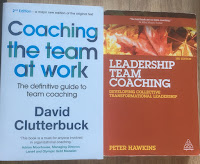To be quite honest, I wasn't confident how well this would work. It was clear to me that I would have to get a few things right for this to work - and then trust the participants to work well together without me eavesdropping (as I usually do when we are working together in the same place).
So I had to be very clear in my own mind, both what they needed to know before the exercise, and precisely how I was going to instruct them to do it.
 Today's session was particularly challenging. We were looking influencing skills. I had to send them much longer pre-reading than I usually do, covering the major styles and the specific behaviours; and I also included the exercise brief as the final page. That was because there was simply too much information for me to explain it all from cold, and still have time for them to practice.
Today's session was particularly challenging. We were looking influencing skills. I had to send them much longer pre-reading than I usually do, covering the major styles and the specific behaviours; and I also included the exercise brief as the final page. That was because there was simply too much information for me to explain it all from cold, and still have time for them to practice.In the event, the session went very well. It was slightly unnerving to put them into groups and then simply wait, trusting them to make good use of the time. But I had decided not to go around the rooms, as I thought that would be disruptive and distracting.
So it was a great relief when they came back to the plenary session, and told me how valuable the exercise had been, and what they had learned from it. It is a great credit to the professors concerned that they were able to practice what is essentially a face-to-face skill in a virtual environment, give each other feedback, polish their skill, and generate and share learning. I think that was a lot to expect of them, and they rose to the challenge really well.
 I still think that this is not the same as spending the time together, not least because it is far harder to have the informal coffee-break conversations. But I have to admit that it is a far better substitute than I had foreseen, and that it also has some advantages that mean I may well continue to work in this way (although not exclusively) even when it isn't the only option.
I still think that this is not the same as spending the time together, not least because it is far harder to have the informal coffee-break conversations. But I have to admit that it is a far better substitute than I had foreseen, and that it also has some advantages that mean I may well continue to work in this way (although not exclusively) even when it isn't the only option.Now that I know that we can do serious skills practice, the benefits of relatively short (2 hour) modular sessions that people can do from their own office or home, and which I can facilitate without needing to travel and be put up in hotels, are very clear. So not quite a complete Zoom convert, but at least a believer in richer approach to mixed delivery.
(images courtesy Chris Mongomery, Austin Distel and Bruno Cervera, respectively, from Unsplash)






